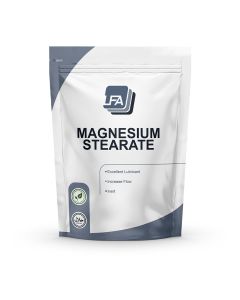Magnesium Stearate
Welcome to LFA’s video on Magnesium Stearate.
Magnesium Stearate is what is known as a dry lubricant or a flowing agent. It is a white water-insoluble powder that reduces the friction at the point of contact between the surfaces of processing equipment. Magnesium Stearate is one of the most commonly used flowing agents and most supplements you’ll find on shelves will include it within their formulation.
It is a magnesium salt that also has two stearic acids. Magnesium is an essential mineral and stearic acid is a saturated fatty acid that’s found in many common foods such as chicken, walnuts, cheese, grass-fed beef and many more.
This is one of the most popular flowing agents in the industry due to how effective it is. It’s also inert meaning it won’t react with other ingredients in your formulation making the tableting and encapsulating process much easier.
Whilst it’s main purpose is as a lubricant, it does have other benefits in a formulation such as an emulsifier, binder, anticaking, thickening and antifoaming agent.
Only a very small amount of Magnesium Stearate needs to be used in any formulation, it commonly ranges between 0.25 to 5% of your total blend
A lubricant is extremely important in a formulation and there are 3 main roles it will play:
- To lessen friction between a tablets surface and the die wall during ejection.
- To prevent the solution from sticking to the parts of a machine that it is currently running through.
- To increase flow by reducing friction amongst the particles themselves.
An excellent lubricant will form a strong layer over the surface. Another positive factor is that it is adverse to a change in process variables. Process variables are a dynamic part of the process that can change in a given way. This will generally be flow, pressure and temperature. If any of these changes occur, it shouldn't affect the manufacturing process.
Magnesium stearate is recognised as GRAS or generally recognized as safe by the FDA.
It is popular for organic and clean label tablet formulations to avoid the use of magnesium stearate. If this is something you're interested in then LFA has natural and organic alternatives, although they’re not quite as effective as magnesium stearate and not suitable for all formulations.

